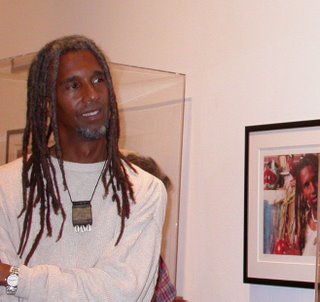
Saturday, December 30, 2006
Soul Brotha Number One: Make it Funky!
Monday, December 25, 2006
Soul Brother Number One!

The supreme liberator; James Brown has passed away at age 73!
What most people don't realize is that he was one of the most influential innovators of the 20th century. Surely, he had become a caricature of himself in recent years but his place in African Heaven was long accounted for.
James Brown liberated African-American music from the clutches of European influenced church music. By himself, he brought the entire world to its feet with his organic, pulsating jungle grooves. Without James Brown there is no such thing as "Funk" and certainly not any art form known as "Hip-Hop".
Not surprisingly, most of the pioneering rap songs of the '70's and '80's featured samples of his music as the backdrop for a new attitude. Why not?
James Brown preceded Fela Kuti as the Blackest African of our planetary system. When he visited Africa in the 1960's he freed African musicians from the constraints of colonial etiquette.
His band was the first group to feature two drummers, two bassists, three guitars and a full horn section! Fela acknowledged, in a film interview, that he had been driven to inspiration by the thoroughly raw African power of James Brown's music. Having seen Fela live on stage, I can attest that he had borrowed much from the Godfather of Soul.
If you need to be reminded of the enormity of the man's legacy, you need only listen to what African-American music sounded like B.J.B. (before James Brown). Then you will truly understand that in the Jungle Groove...he took us back to Africa!
Sunday, December 17, 2006
The age of citizen journalism is upon us!

NEW YORK (Reuters) - You were named Time magazine "Person of the Year" on Saturday for the explosive growth and influence of user-generated Internet content such as blogs, video-file sharing site YouTube and social network MySpace.
"For seizing the reins of the global media, for founding and framing the new digital democracy, for working for nothing and beating the pros at their own game, Time's Person of the Year for 2006 is you," the magazine's Lev Grossman wrote.
The magazine has put a mirror on the cover of its "Person of the Year" issue, released on Monday, "because it literally reflects the idea that you, not us, are transforming the information age," Editor Richard Stengel said in a statement.
Saturday, December 09, 2006
Unique Podcast this week

This Week's 'One Tribe, Many Voices' podcast features an educational project that I did for incarcerated teens. Sometimes it seems as if 75% of all Black & Latino boys have been incarcerated in this state. Every time that I have visited a correctional facility, I have been startled by the sheer numbers of young men who are being warehoused in the United States.
In many neighborhoods, incarceration has become a 'rite of passage' for young men. There is no negative stigma attached to their plight since it is more the norm than an anomaly. For many, imprisonment has become the path most trodden. It may be the more likely 'straight path' for those who find grade school irrelevant.
The most disturbing reality is that serial incarceration has breed a generation that is not uneasy with the dehumanization of imprisonment. Some young men feel more self assured within the confines of correctional facilities. They know what to expect and they know what is expected of them. The the halls of justice and education present a clearer danger to them. Could the ugly secret be that society has no use for most of them? Are they taken out of the economic equation early in life so that America can make the numbers look good? Are they factored into the percentage of America's success quotient?
Friday, December 08, 2006
Rasheed Ali & Rain People $9.99 on iTunes
 Rasheed Ali & Rain People + Your iPod= Timeless Pleasure
Rasheed Ali & Rain People + Your iPod= Timeless PleasureA World of Music, Five Magical CDs
Download Your Favorites Today
Saturday, November 25, 2006
In Memory of Walter Booker 1933-2006



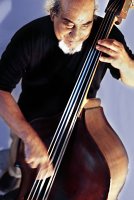

Today I was informed of Walter Booker's passing after a long illness. His enormous impact on my most impressionable teenage years cannot be quantified by me. He helped me and an entire generation of young New york musicians develop an understanding of recording and he provided us with a musical playground with which to grow our self-expression.
In all of our lives there are teachers and mentors. In my life, one of the most influential and inspiring human beings was Mr. Walter Booker. He was a superb bass player, an innovative genius and a free-thinker whose intellect knew no boundaries. A man who was equally comfortable talking physics and Buckminster Fuller as he was talking about quarter notes.
One of Walter's crowning achievements in life was Boogie Woogie Studio which he built in his New York City apartment! The studio was a marvel of ingenuity that converted an unassuming apartment into a creative haven for some of the greatest jazz musicians in the world. Walter managed to build a Studio-A and a Studio-B, both equipped with control rooms. The soundproofing alone was a feat of modern engineering! Never did we musicians fear the wrath of irate neighbors because Walter's studio was a work of near perfection.
Boogie Woogie Studios was a fully equipped home studio long before home studios were invented. It was also the home of my high school band; Natural Essence. We rehearsed there several times a week and eventually many of us lived there. We all slept on the studio floor at some point. Boogie Woogie gave us a chance to "eat, sleep and drink music".
Young basketball players need a gym but young musicians need a studio, a place to work things out. Walter Booker's Boogie Woogie Studios provided all of us kids with a safe place to grow. We were not only closer to the music and the equipment, we were closer to the older musicians who were Booker's peers. A who's who of jazz greats that came to the studio to rehearse and record including; Wayne Shorter, Joe Zawinul, Herbie Hancock, Flora Purim & Airto Moreira, Freddie Hubbard, Stanley Clarke and many, many more. Miles Davis would come through and so would Richard Pryor. His place was a creative lab for many musicians. I witnessed many magical moments in that converted apartment that helped transform my life.
Boogie Woogie was at the epicentre of some seismic musical upheavals and we kids were there to participate and observe. I learned as much about life from hanging out with the "old heads" (the seasoned jazz musicians) as I did about music. These were black men who had circled the globe with their musical talent, their worldliness was never lost upon my inner city sensibilities. Eventually, we all had a chance to record with the great musicians we held in high esteem. Like some old boxing gym where wide-eyed hope fulls get a chance to train side by side with champions, Boogie Woogie served history. In our hearts today there is gratitude for a gracious man who gave much more than he took. That is always the true measurement of a man.
We called him "Uncle Bookie" because he really treated us like his family.
______________________________________________________________
Walter Booker was born in Prairie View, Texas in 1933 and moved with his family to Washington, D.C. in the mid 1940s. It was not until 1959, at the age of 26, that Bookie began playing the bass while in the army (serving side-by-side in the same unit with Elvis Presley). Shortly after leaving the service, he became a member of Andrew White’s JFK Quintet, a group of young D.C. musicians accomplished enough to attract the attention of Cannonball Adderley, who produced a recording for them. Bookie’s next gig was to tour the
n 1964 Bookie moved to
In 1969 Bookie was invited to join the Cannonball Adderly Quintet, an association which lasted until Cannonball’s untimely death in 1975. Also during that time he designed, built, and ran Boogie Woogie Studio, a mecca for musicians from all over the world.
From 1975 to 1981 Walter was Sarah Vaughan’s bassist and continued to produce recordings at his studio. He and the studio helped shape a number of up-and-coming young groups, including Natural Essence. And he became deeply involved with Brazilian music, ultimately forming Love Carnival and Dreams, one of the more successful Brazilian jazz groups on the
During his long and fruitful career he played the bass with many great artist, including; Joe Zawinul, Chick Corea, Wayne Shorter and Pharoah Sanders.
Tuesday, November 21, 2006
Only the fool starves in the midst of abundance.
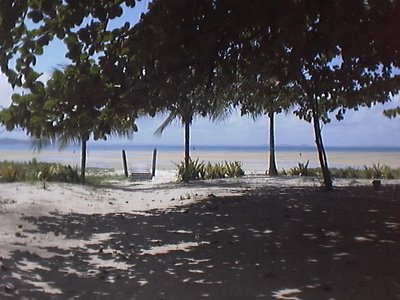 I have posted 98 blogs here on Blogspot since this all began in April. I have also posted 133 blogs on my Spanish blog since June. Most of the photography is mine or "in house". I have tried to keep the subject matter interesting yet not too 'heavy'. I am not sure how many people are true subscribers but I do appreciate the support that has been extended to me. I hope that everyone who arrives here will take the time to investigate the many posts in the archives. I have purposefully slowed down the frequency of my postings so that viewers can "catch up".
I have posted 98 blogs here on Blogspot since this all began in April. I have also posted 133 blogs on my Spanish blog since June. Most of the photography is mine or "in house". I have tried to keep the subject matter interesting yet not too 'heavy'. I am not sure how many people are true subscribers but I do appreciate the support that has been extended to me. I hope that everyone who arrives here will take the time to investigate the many posts in the archives. I have purposefully slowed down the frequency of my postings so that viewers can "catch up".I now have a podcast as well. This is a unique form of communication that allows me to add another dimension to the on-line version of me. I am able to present my own 'rain people radio show'. I have many ideas for this new media but I don't want to over-saturate the 'airwaves'.
I invite one and all to investigate the archives here; enjoy!
Sunday, November 19, 2006
One Tribe, Many Voices Friends Worldwide!
Friday, November 17, 2006
My War Against Eurocentric Academia

I just received a comment concerning my last post: "The Call of the Berimbau". Unfortunately, it was posted anonymously. If you post a comment anonymously you are unlikely to actuate a real dialogue. I am rather annoyed but I am not anonymous however.
cientista wrote:
"Actually the Berimbau predates colonial Brazil and therfore capoeira. In fact it is widely believed that it was not introduced into capoeira until the late nineteenth century. As a result it is frequently played outside of capoeira with other significance."
_____________________________________________________________________
For those who don't know me I will explain that I am also a classroom teacher. In fact, I am on my way to school now! I awoke to this comment that hints at misconceptions that I cannot overlook. Though e-mails tend to lack a certain defining nuance that explains more about a person's intellectual stance, I think I understand where this person is coming from.
So, my disclaimer is; I may have the wrong handle on this person's intent but here's my response.
The person also sent me information on the origins of the Berimbau, so let me give them information as well.
________________________________________________________________
Firstly, I teach the origins of the 'berimbau' everyday. Most recently at Occidental College.
I have constructed 'berimbau' and I have spent hours listening to their music in Brasil and South Africa.
The "berimbau" is only one ethnic group's representation of the world's oldest musical instrument. The one-string musical bow. It not only "predates" capoeira it predates the drum, the flute and all other instruments. It was most likely derived from a bow & arrow used by hunters. It is found primarily among the people of the southern portion of Africa; southward from Angola through Namibia to South Africa. The so called "Bushman" or Khoisan have several versions.
When I was in South Africa to lecture at Stellenbosch University I became quick friends with a music professor who is writing a book on the indigenous musical instruments of southern Africa.
She shared with me her many primitive 'berimbaus' and 'quicas'. She has also gone out into the Kalahari Desert and taken video of Khoisan using this very ancient instrument. I felt as if I was transported back in time by this truly aboriginal instrument.
I am constantly at war with western academia's assertions about the world's oldest society:Africa because every shallow European viewpoint is assumed to be expert and sacrosanct.
To state that the berimbau predates the art of capoeira therefore is to state the obvious. To say that it wasn't "introduced" to capoeira until the late nineteenth century is misguided intellect.
To say that the 'berimbau' was "introduced" to capoeira is like saying that the conga was introduced to the rumba.
The historical record proves that the majority of enslaved Africans taken to Brasil were from the area of Angola. The 'berimbau' had already been a part of their cultural expression for countless centuries. In the 'New World' of the Americas, the Africans ability to express the full lexicon of their cultural expressions was limited by their position in white society. Very little of the African's true identity was expressed openly upon his arrival in the Americas. We were not an 'immigrant' group we were a kidnapped group!
The capoeira master's (Mestre Accordeon) statement: "The exclusive use of the Berimbau to make music with no relation to Capoeira is like using an authentic Samurai sword only for pruning the back yard". is a statement of great dignity.
It reminds us that everything that the African preserved was inescapably tied to a spiritual code. It is a cornerstone of African principle that is the core of the African's cultural survival.
His statement is very clear; if you want to practice capoeira then it must be performed to the soundtrack of the world's oldest instrument, it must always be acknowledged as being a link to the past. In Cuba and Puerto Rico we have the same chatter concerning the Bata drum. The Bata predates the African's attempts to hide his true identity as a Yoruba just as the Berimbau predates the African's attempts to hide his true identity as a Bantu.
Wednesday, November 15, 2006
The Call of the Berimbau

"The exclusive use of the Berimbau to make music with no relation to Capoeira is like using an authentic Samurai sword only for pruning the back yard". -Mestre Accordeon-
"It is impossible to learn Capoeira without the Berimbau."
-Mestre Bimba-
"The Berimbau speaks through the gourd to the Capoeirista."
-Mestre Accordeon-
Monday, November 13, 2006
The Rumba will never end!
Saturday, November 11, 2006
Rasheed's One Tribe, Many Voices Podcast !

In the last few week's I have initiated my Rain People Podcast Radio show on podOmatic.com. I am very excited that I have realized this dream of having a Radio Show devoted to the Rain People sound and cultural concept.
I will post a new show every Wednesday. It gives me an opportunity to present my music in a commercial-free format. The podcast format will allow me to feature unreleased tracks that I am working on as well as some lengthy tracks that are not radio-friendly.
Unlike a radio show, you never have to miss a podcast. You can listen whenever you feel like it. I hope everyone enjoys my weekly show as much as I enjoy recording it.
What is the Concept of Fine Art in Africa?

I am a visual artist besides being a musician. I received a fine arts education and I have been an elementary school art teacher. When I travel I always look for indigenous art work, authentic pieces by local artisans. It can be difficult to sort through the mountains of generic souvenir art to find that unique piece. In every third world country I have been to, there has been a movement to exploit local art and culture as a cash commodity. The economic burdens of third world countries lean heavily upon local artisans. I have toured the back alley souvenir factories where men and women churn out cloned artwork by the hundreds. Sometimes there are only slight deviations from an ancient artistic formula. For western thinkers and art collectors there may be a sense that these arts pieces are devalued by their sameness. Yet upon further examination we find that the style of many art pieces has been ritualized over time.
In many instances we will find that the artistic style of everyday objects have been codified into a handful of designs. For instance, there may only be two or three print patterns for a Nigerian gourd bowl. The question becomes; are these pieces considered perfect recreations of classical works? Do these art pieces represent the power of African apprenticeship, family traditions that never stray from the past?
Monday, October 30, 2006
The Spirit of Africa: Part-2
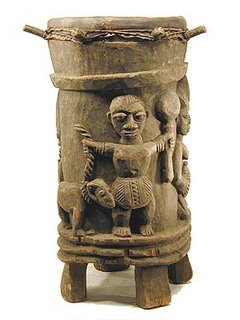 The African was not alone in recognizing the spirit of life that surrounded him.
The African was not alone in recognizing the spirit of life that surrounded him.The power and beauty of nature is on display in every region of planet earth.
Yet, upon first contact with Africans, Europeans failed to see the beauty inherit in the Africans reverence for nature.
The belief that "everything is alive or "everything has a soul" helped to foster a conservationist mentality in most parts of the continent. Flora and fauna were not abused or overly exploited. Saying a prayer before slaughtering an animal or cutting down a tree were rituals that created a spiritual accountability. Humans acknowledged their place as custodians of the land.
Saturday, October 28, 2006
The Spirit of Africa: Part-1
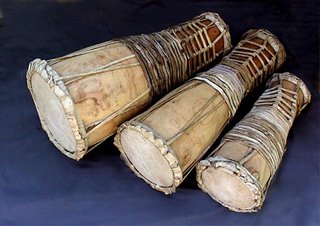
For hundreds of years we have lived under the tyranny of Eurocentric academia.
What the European thought of us was enforced by his own religious imagery. We had no image of an African Jesus to act as a counter balance. Volumes of European scholarly works were filtered through the prism of abject racism.
If we believed that he was a god, then his academia was also god-like. His perceptions of other cultures was always filtered through his emperical beliefs.
When Europeans encountered Africans in the 15th century, they were so convinced of their own superiority that they deemed the majority of Africans to be primitives. Even confusing the world's primordial people with primates.
We have as historical proof the countless cartoons that depicted us as resembling the great apes of Africa.
To portray us as less than human was a necessary ploy in enabling the immoral enslavement of the continents' children.
Central to their erroneous judgement of Africans, was their inability to understand our belief systems. Ironically, what we believed and how we came to believe it, was the most significant aspect of our African societies and cultures. The African belief systems were the nucleus of their daily lives. Their beliefs could not be extricated from their society and culture. Art, dramatic passion plays, music, dance, ritual, ceremony, custom, medicine and faith were all interwoven into the fabric of African life. To not understand the depth of what we believed; was to not understand us at all.
In fact, we people of the African Diaspora are living proof that the Africans belief systems could be preserved through the erosion of time,distance and counter-cultural domination.
Thursday, October 26, 2006
The African in Puerto Rico: An Overview
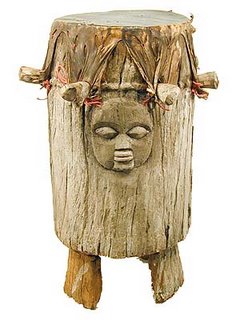 In 1511, several indigenous Taino Caciques in Puerto Rico allied with the Caribs and tried to oust the Spaniards. The revolt was pacified by the forces of Governor Juan Ponce de Leon.
In 1511, several indigenous Taino Caciques in Puerto Rico allied with the Caribs and tried to oust the Spaniards. The revolt was pacified by the forces of Governor Juan Ponce de Leon.It is written that after the native revolt was surpressed some Tainos fled the island and others jumped into the sea rather than be enslaved by Spaniards. The Tainos who remained on the island were decimated by European diseases.
A new labor force would be needed to satisfy the voracious appetites of the Spanish. In 1517, the Spanish Crown permitted its subjects to import twelve slaves each in what became the beginning of the slave trade in the New World.
The Spaniards coined the term 'Bozales' for those brought to the New World straight from Africa. They consisted of Africans from different regions and ethnic groups. This was done to prevent them from communicating with each other and planning an uprising or revolt.
The first enslaved Africans to arrive on the island of Puerto Rico in any sizable numbers were from Senegal. The next group were the Mandingo from the Western Sudan.
Despite the Spaniard's precautions,they could not stop the enslaved Africans from mounting the first recorded rebellion in Latin America (July 26-Nov 23, 1514). King Ferdinand of Spain then authorized Seville to import Africans only in groups of 50 (up to 200), so they could be more easily controlled.
Later arrivals to the island were from the Guinea area. People who were preferred for their perceived quality of; "not being war-like". After the slave revolt of 1527, Spanish edicts were passed prohibiting the importation of Africans from Islamic areas since; "they do not make good slaves and they are prone to revolt".
According to historian Luis M. Diaz, the largest contingent of Africans came from the Gold Coast, Nigeria and Dahomey, or the region known as the area of Guineas, the Slave Coast. However, the vast majority came from the Yorubas tribe from Nigeria and the Bantus from the Guineas. The number of slaves in Puerto Rico rose from 1,500 in 1530 to 15,000 by 1555. The slaves were branded on the forehead with a stamp so people would know they were brought in legally and that way they couldn't be kidnapped. The cruelty of hot branding was stopped in 1784.
The African slave was sent to work the gold mines, as a replacement of the lost Taino manpower, or to work in the fields in the islands ginger and sugar industry. By 1570, the gold mines were declared depleted and no longer produced the precious metal. After gold mining came to an end in the island, the Spanish Crown basically ignored Puerto Rico by changing the routes of the west to the north. The vast majority of the white Spanish settlers left the island to seek their fortunes in the richer colonies such as Mexico and the island became a Spanish garrison. The majority of those who stayed behind were either Bozales or Creoles (of mixed race).
An official Spanish edict of 1664 offered freedom and land to African people from non-Spanish colonies, such as Jamaica and St. Dominique (Haiti), who immigrated to Puerto Rico and provided a population base to support the Puerto Rican garrison and its forts.
These freeman who settled the western and southern parts of the island, soon adopted the ways and customs of the Spaniards. Some joined the local militia which fought against the British in their many attempts to invade the island. It should be noted that the escaped slaves and freedman who immigrated from the West Indies, kept their former masters surnames which normally was either English or French. This is why it is not uncommon for Puerto Ricans of African decedent to have non-Spanish surnames.
After the successful slave rebellion against the French in St Dominique (Haiti) in 1803, the Spanish Crown became fearful that the "Criollos" (native born) of Puerto Rico and Cuba, her last two remaining possessions, may follow suit. By the time Spain reestablished her commercial ties with Puerto Rico, the island had a large multiracial population. Therefore, the Spanish government issued the Royal Decree of Graces of 1815, attracting European immigrants from non-Spanish countries to populate the island believing that these new immigrants would be more loyal to Spain. However, they did not expect the new immigrants to racially intermarry as they did and identify themselves completely with their new homeland. The decree encouraged slave labor to revive agriculture and attract new settlers. The new agricultural class now immigrating from other countries of Europe sought slave labor in large numbers and cruelty became the order of the day.
The Spanish government had lost most of its possessions in the New World by 1850. The Spanish government in fear of an independence or slavery revolt imposed draconian laws, "El Bando contra La Raza Africana", to control the behavior of all Black Puerto Ricans, slave or free. It is for this reason that we see a series of slave uprisings in the island, from the early 1820's until 1868.
Even though one of the reasons that the Spanish Crown put the Royal Decree of Graces of 1815 into effect was to "whiten" the islands population by offering attractive incentives to non-Hispanic Europeans, the new arrivals continued to intermarry with the native islanders. By 1868, the majority of the population of Puerto Rico was interracially mixed.
On September 23, 1868, slaves, who were promised their freedom, participated in the short failed revolt against Spain which became known in the history books as "El Grito de Lares" or "The Cry of Lares". Many of the participants were imprisoned or executed.
Finally, on March 22, 1873, slavery was abolished in Puerto Rico. Slave owners were to free their slaves in exchange of a monetary compensation. The majority of the freed slaves continued to work for their former masters with the difference that they were now 'freeman'.
Many of these freeman started settlements in the areas which became known as Cangrejos (Santurce), Carolina, Canovanas, Loíza Aldea and Luquillo.
Sunday, October 22, 2006
My Next CD is Inspired by Katrina

"Katrina"
For us, Caribbean People, hurricanes are not para-normal events. You grow up hearing stories about devastating hurricanes and you get to experience a few yourself.
In fact, there have been a few hurricanes that have contributed to the migration of Island People to the States!
True fact is...most hurricanes develop off the coast of West Africa, churning through the Middle Passage. Many an African met their demise along that route of kidnapped and enslaved people. One of my good friends said it was a strange irony that storms come up from this watery burial ground to reek havoc on the Americas.
"The Invisible made Visible"
Katrina stripped America naked, exposing the world to the stark realities of an invisible economic underclass that toils within the shadows of America's opulence. Many people navigate the daily treachery of Urban America with profound ingenuity but "the roof was torn off the house" and even the strong could not survive!
"The Rain Does Not Fall On One Roof"
-Ewe (Ghana) Proverb
African Wisdom reminds us that we are all subject to the sovereignty of the Earth's Elements.
___________________________________________________________________
"Hurricane on the Horizon" was inspired by Katrina and some other world issues. Unlike my last few CDs this CD will be entirely in English.
Sunday, October 15, 2006
Part-4: The Happy Slaves
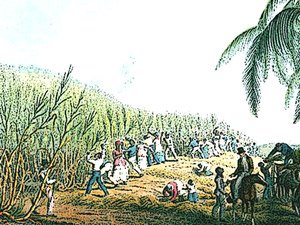 There is this continuing myth about the enslavement of Africans in the tropical Americas.
There is this continuing myth about the enslavement of Africans in the tropical Americas.This fallacy persists that we island people were 'the happy slaves'.
I have seen the old Eurocentric lithographs that depicted swaying palm trees and cheerful Africans scurrying about.
Among African-Americans in the US there is this perception that island people had an easier time in their servitude. There is this idea that we escaped the brutality and the horrors of captivity and enslavement.
A few months ago I posted photgraphs that I had taken in San Juan's Museum of African Heritage. Shackles and grotesque torture devices of every sort were on display to remind us that the cruelty of the colonizers crossed every European border.
The eternally radiant disposition of our Caribbean people does not owe itself to any historical leniency on the part of English, French, Portuguese, Dutch, Danish or Spanish plantation owners.
Thursday, October 12, 2006
Thursday, October 05, 2006
Part-3: Preserving The Indigenous Identity
 On my last journey to Brasil, in March 2006, my friend put this Tupi indian crown atop my head. Why did I feel so uncomfortable wearing this ornate crown of Amazon bird feathers?
On my last journey to Brasil, in March 2006, my friend put this Tupi indian crown atop my head. Why did I feel so uncomfortable wearing this ornate crown of Amazon bird feathers?After all, my grandfather had explained to me that his mother was an indigenous indian.
If I was an American I would therefore be afforded the identity,"rights" and status of a 'Native American'. Being a Carib or Taino indigenous American does not afford you the right to any official racial distinction. Maybe that is why the crown was so uncomfortable to bear atop my head.
The Tupi are one of the surviving indigenous ethnic groups in the Americas. Many of the indigenous people of the Caribbean where not as fortunate. Not having a dense jungle as a refuge, made the natives more susceptable to wholesale slaughter and European diseases.
It can be said that human bloodlines do not easily disappear into the sunset of history .
Though civilizations might seemingly vanish without a trace or be vanquished by genocide;human bloodlines remain.
Walk down the streets of any major American city and you will see the faces of Mayans,Aztecs,Olmecs and Incas. What about the indigenous of the Caribbean?
Though a significant population of indigenous people still exist on the islands of Dominica and Trinidad,the more significant number protected their bloodlines by intermarriage.
The Taino,Lucayan,Ciboney,Arawak and Carib were not extinguished from history.
They did have to blend their bloodlines with both Europeans and Africans to survive.
In some cases, as with the Spanish and Portuguese, these mestizo bloodlines were even more convoluted because the Europeans themselves had already mixed with North African Berbers and Arabs.
The surviving creole ethnicity still managed to retain a cultural identity by keeping to themselves in small communities. The result is that when you walk down the street in Arima,Trinidad (as I have) you see a multitude of indigenous faces. It doesn't matter that the Caribs in Trinidad may have intermarried with East Indians, the culture and bloodlines have not been made extinct. The Taino bloodlines of the Greater Antilles (Cuba,Santo Domingo & Puerto Rico) were thought to have been completely extinguished. Recent books have dispelled this myth. A recent genetic study done in Puerto Rico estimated that more than 60% of the population have Taino bloodlines. Actually, this was no surprise to people on the island who eat pasteles, guanemes and cassabe bread and refer to many dark-haired girls as "la India".
In Puerto Rico, as in other islands, the Taino survived by going into the central mountains.
In other parts of the Americas, African maroons were given shelter by indigenous people.
The Garifuna of Central America being an example of how this blending of bloodlines allowed both cultural imprints to survive. Though there may not exist any "pure Caribbean Indians"
the culture is far from extinct. People do not willingly disappear into the sunset of history.
Here are some of the original names of Caribbean islands:
Cubanacán (Cuba), Waitikubuli (Dominica), Boriken (Puerto Rico),Cairi (Trinidad)
Quisqueya (Dominican Republic) Xaymaca (Jamaica) and Lucayas (Bahamas).
Thursday, September 28, 2006
Part-2: We protected our ideas without weapons
 "La Mala Lengua" / Cuba / a warning to those who tell
"La Mala Lengua" / Cuba / a warning to those who tellWe preserved our ideas without books and we protected our ideas without weapons.
The concept of secret fraternal orders was not foreign to Africans.
In a hostile new world; secrecy was survival. The art of secrecy had already been ritualized for Africans. Males and females each had their clandestine rites of passage. The traditions of sacred societies such as the: Sacred Grove, Oro, Ogboni, Poro and Ikuma were well established before the slave trade. Long before contact with Europeans; the Africans held to the principle that the truly sanctified should be guarded, concealed and secluded. The dense landscape of the tropics made it easier for Africans in the Caribbean to sequester their religion and their true identity. Of the colonial masters; it was the English who most actively prevented and prohibited Africans to openly congregate. The Portuguese and Spaniards were at times more negligent in preventing mass gatherings of Africans. The historical result is that in both Cuba and Brasil, the two most populous colonies, enslaved Africans were more able to establish places of worship. Mandatory convertion to Catholicism created the pretense that allowed for the practice of the syncretic "Santeria" and Candomble. However, the negligence of the Iberian colonizers cannot be confused with sanction and liberty. Both the Portuguese and Spanish were as ruthless as the English, Dutch and French; as the historical record provides.
The need for secrecy as the rule for preservation of the most important icons was persistent among all enslaved Africans. Only the initiated could be entrusted with the important task of preserving the wisdom of the ancestors. As it was in Africa, so it was in the Americas;not everyone or anyone was entitled or vested in the sacred. Eventually, the immutable bonds of cult members was the foundation for revolts and rebellions.
Wednesday, September 27, 2006
Part-1: Preserving an Idea

This is an interesting photograph from contemporary Central Africa. These salesmen are selling their faux Western clothing wares; jeans, big t-shirts and the like. The photographer said that they were all very pleased to explain to him that they were "real niggers" who had all the latest hip-hop styles for Africa. It may seem, at first glance, amazing that any African would be pleased with himself for being a "nigger". It might startle one to think that contemporary American culture could so easily trump African sensibities. It might surprise any sane person that such an injurious word, that so easily escaped the vitriolic mouths of racists, could find a home on the revered continent of the Maroons. We who fought to preserve every taste of herb, every sacred drum beat, every nuance of culture that we could inject into a foreign tongue.
We are apalled! We who created secret societies in order to honor our ancestors' memories; are apalled! We shall put a curse on the deaf, dumb and blind. Those who are deaf to the muffled cries of our mothers and fathers. Those who are dumb and numb to the sensations of a collective soul. Those whose eyes are veiled to the brilliance of ideas preserved without books. Those are the accursed, the damned. After centuries of dreams. After centuries of memories. After centuries of yearning to be like them, now we can finally travel back through the middle passage to discover that they no longer exist.
Yet, my people know. My island people know that which they always knew.
The great undiscovered land of ideas that we preserved without books.
Tuesday, September 26, 2006
"Fica no Brasil" (Stay in Brasil) Underground Version
| Artist: Rasheed Ali & Rain People CD:Tristeza e Beleza na Cidade Negra (Sadness & Beauty in the Black City) Label:Digital Rain Factory 2005 Rasheed ali composed and recorded this music in Salvador da Bahia, Brasil in 2005. | |
Tristeza e Beleza (Underground Version)
| Artist:Rasheed Ali & Rain People CD:Tristeza e Beleza na Cidade Negra Label:Digital Rain Factory | |
Monday, September 25, 2006
Sunday, September 24, 2006
ñáñigo / Abakuá
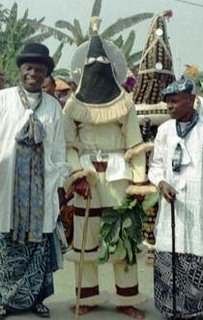
ñáñigo
I am not only an African drum maker, I also repair drums.
I replace the goatskin heads on djembe drums. When I work with drums I always feel as if I am doing something that one of my ancestors had done long before me. I feel as though I am channeling this wisdom from the great beyond of my ancestors.
I was never formerly instructed in the art of drum making by anyone. Yet, I can say that I was instructed in drum making by guiding spirits. I have made hundreds of drums and my drums have been featured in two major museum exhibitions.
One day I repaired some drums for Onoche Chukwurah who is an Igbo storyteller from
Some things that happen to me are quite esoteric and difficult to explain; in terms of my knowledge of
Something esoteric was sparked in me by Onoche's comment about the Efik ethnic group. Earlier, I had told my older brother (who shares my passion for African cultural research) that I had a feeling that we had some connections in our family to the area of
When one thinks of the ethnic groups that have discernible cultural influence in the
I had heard the Abakuá music of
When I was younger, my mother would always refer to ñáñigo whenever she referred to traditional African religion. She never said Lucumi, Santeria, Obeah,Vodun or Palo. As far as I was concerned, there were some unexplained spirit concepts that I didn't understand but I only knew one word to describe them: ñáñigo. It was a word that I heard my mother and my grandmother use often but I thought Lucumi and ñáñigo were one and the same. When I got older I mistook ñáñigo for ñágo. What I did not realize is that ñáñigo and Abakuá are the same. Some people say that the secret society practiced a malevolent sorcery, still others disagree.
Looking at the Abakuá ceremonial costume I see some similarities with some of the masquerade costumes in
Saturday, September 23, 2006
The Living Dead...
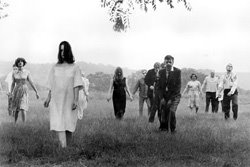 It is the nightmare that I am living. It is the night of the living dead.
It is the nightmare that I am living. It is the night of the living dead.They are walking the streets next to me. They are in the car next to me on the freeway. They are at the grocery store, on line in front of me, on line behind me. They are everywhere; the living dead. They just bought the house next to mine. I see them on the television.I hear them on 'talk radio'. At least they are not 'here' reading my blog. I am happy for that. I do not have to worry about them being 'here' because they cannot read. The living dead have eyes but they cannot read. Here; I am safe!
Wednesday, September 20, 2006
What Does Any Of This Have To Do With Music?
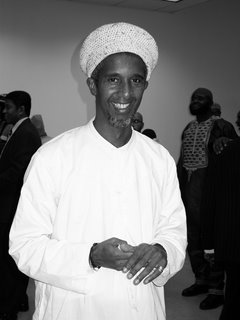 When I pick up my telephone these days it makes a terrible sound. It's a sound that you used to hear years ago when you were making an overseas call. It's an odd sound because we know that telephones can be tapped silently but somebody made a mistake with my phone. This odd sound is an obvious reminder that someone out there thinks that I am worthy of a wire tap.
When I pick up my telephone these days it makes a terrible sound. It's a sound that you used to hear years ago when you were making an overseas call. It's an odd sound because we know that telephones can be tapped silently but somebody made a mistake with my phone. This odd sound is an obvious reminder that someone out there thinks that I am worthy of a wire tap.Could it be because I'm a World Music Musician?
Is it because I'm a Recording Artist who has recorded several CDs?
Is it because somebody out there has heard one of my songs on the local World Music Radio show?
Is it because somebody read one of my Blog postings and decided they'd rather hear my actual voice instead?
Is it because I've been interviewed by the L.A.Times Sunday Section?
Is it because I my art work was included in a Smithsonian Institute Traveling Exhibition? Maybe It's because I've been on a National Television Commercial that ran for a few years, it must be that, right?
Or is it because the last name on my passport is: Ali and I've taken a few plane trips in my life?
Before September 11, 2001; I was never asked to exit the passenger boarding line on an international flight and interogated by the Federal Police of a foreign country.
Before September 11, 2001; I never noticed well dressed, clean-cut individuals sitting in sensible American sedans parked outside my tree lined residential street.
Of course that was before the dawning of The New World Order:Part-2.
Does any of this have anything to do with music, anyway? So guys, please tell the other guys
(on the silent end of my telephone) that I'm just a musician.
Oh yeah, if you've never heard my music and you're not a fan, please tell the guys at Homeland Security that I need CD Sales badly.
I'm on iTUNES and many other download sites like; Rhapsody, Napster, etc.
Hey! I'm even on Verizon Ringtones, in fact in Japan you can download my music to your telephone guys. I just want to make your surveillance down-time pleasureable and interesting. Just trying to do my part for National Security. I figure we don't want any miserable D.H.S. agents out there without any cool sounds on their iPOD.
If all else fails, how about the next time I make an out going call, I can blare my music into the telephone. Ok? I know it sounds ghetto but then you can make a mix tape of my conversations and my music and download it to your iPOD.
On second thought; can you guys just go to CDBaby.com and purchase my CD ? If you're really cheap, you can download my individual songs for $.99! Please guys, help me out here!
Anyway, sorry I'm so long winded guys but then again you guys already know that I hate the telephone. Duh! Give my regards to John Ashcroft... Oh, that's right...he's not with you guys anymore. Peace!
To Get DHS /FBI / CIA Special Discount on all Rasheed Ali & Rain People CDs Click This Link!
Tuesday, September 19, 2006
What is this unique love that we Island People share?
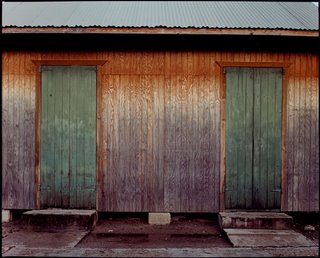 Sure, all people have some sort of attachment to their homeland, their people, their culture or their region. Many people have some tribal attachment to their race or color but few people share the unique bond that Caribbean people share.
Sure, all people have some sort of attachment to their homeland, their people, their culture or their region. Many people have some tribal attachment to their race or color but few people share the unique bond that Caribbean people share.In order to understand this phenomena we must first look at the name
If you look at most sources they claim that the region was named for the indigenous Carib Indian Tribe. Historical evidence affirms the Arawak, Taino, Ciboney, Kaniripbuna (Garifuna) & Lucayan tribal names but what about the name Carib? There is no evidence that the indigenous people called themselves Carib. In fact they called themselves: the Kalinago. It was the Europeans who called these people the Caribs. While Christopher Columbus was still on first voyage he picked up the word, or something like it, from the Tainos on the
My knowledge of Arabic led me to contemplate the mistake with the name.
I think it is really interesting that the Arabic word: Qaribun translates as; something that is close in proximity or related. Qaribeena would refer to; several things in close proximity or relationship, relatives or kin. What is easily overlooked is the fact that many crew members among Christopher Columbus' expedition spoke Arabic as well as Spanish. The sailors would obviously had commented on the relative sameness of the tropical island chain that arcs from
The feeling of kinship among
Thanks to the landscape of urban centers in the United States, Caribbean immigrants are forging yet another identity as they create a new Creole mix for the 21st century. Today, island people are interacting with each other more than ever. Despite the close proximity of the Caribbean islands, inter-island travel was not necessarily easy in the past!
Urban centers like Toronto, Brooklyn, Miami, Boston, Washington DC, London,etc. are helping to facilitate social intercourse & intermarriage among Caribbean people. As we reclaim our real heritage I expect we will discard the false mantel of colonial identity. I expect we will identify less with the French-Caribbean, the English Caribbean, the Spanish Caribbean or the Dutch Caribbean.
Friday, September 15, 2006
Hurricane on the Horizon
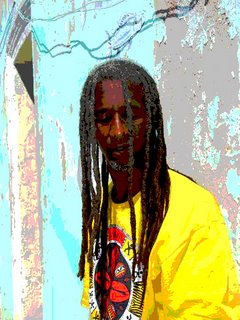
My last post was about how difficult it can be to "block out" the world and just create.
Artist live in the world and sometimes our art is an escape from this world.
Other times our art is a commentary or an exposé of the world that we know.
Either way, my music is my life and my life is my music.
I am about to return to the recording studio to record a new CD: "Hurricane on the Horizon".
It has as its inspiration ; Hurricane Katrina.
The songs for this CD are about the bulding firestorms in the world today. There are many storms on the horizon, not unlike Katrina, many people are not heeding the signs.
Listen: Thunder in the Jungle
Wednesday, September 13, 2006
Trying to Stay Creative When Hatred is Everywhere
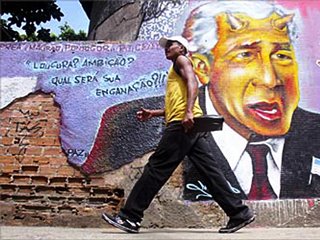 I have devoted the majority of my life to the pursuit of my Art, my Craft: Music.
I have devoted the majority of my life to the pursuit of my Art, my Craft: Music.Despite my devotion to my creative forces, I do not worship music. Music is not my God!
Music is, however, the means that I utilize to serve my God. What does that really mean?
It means that I am an extreme pacifist that has found the same state of transcendent peace in music as I have on the prayer rug.
I have found the same trance-inducing intoxication in the dynamism of my drumming as I have in the recitation of my prayers.
I have expressed the joy of lyricism with my piano and my compositions just as I have earnestly delivered the call to prayer.
By remaining creative in the face of fascist hatred; I honor the ultimate creative potentiality of the universe.
When the ugliness of loud voices threatens to render my altruism paralyzed; I make a joyful noise.
Wednesday, September 06, 2006
Autumn; the gathering time.

I love September! It is the ninth month of the year and it is a month with a powerful vibration. It is not by chance that school begins in September. It is a month that demands our attention. It is a gathering time for our personal year. We must set aside the freedom of summer and collect our thoughts for year's end. I always felt that September was a very serious, no nonsense month. September gives us a chance to take stock in ourselves and gather our strengths to expand or clarify our vision. In September people feel a sense of resurgence and return to business. I love September. My dreams are renewed come September. I have big plans for Rain People! It's September! Rejoice!
Monday, September 04, 2006
"Bastards of the Party"
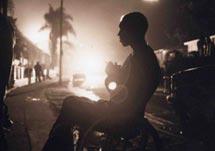 Sometimes a movie or book title can confound or mislead.
Sometimes a movie or book title can confound or mislead.When a new friend invited me to see a screening of "Bastards of the Party" I was both confounded and misled by the title of this documentary movie.
Though I didn't have any preconceived notions about what journalistic stance the movie would take on Los Angeles street gangs, I didn't like the title. Maybe I assumed that I wouldn't find any redeeming qualities in a film about L.A. 's Bloods and Crips. As an educator, I am no stranger to gangs having worked with incarcerated youth throughout Los Angeles. I always felt that street gangs were a misguided criminal fraternity that was killing our inner cities. This film goes further in depth than any documentary I've ever seen on this subject.
Maybe the brilliance of this film owes to the fact that it is directed by an insider, a Bloods member. The film neither condemns nor glorifies the ethos or pathology of gang-banging but it explains the history that has heretofore escaped the vision of outsiders. I never knew that the gangs ever had any political affiliation or revolutionary agenda. This documentary opened my eyes to the political perversion of the Black Nationalist movement that created L.A.'s infamous street gangs. This film illuminates a necessary missing link in our African-American history, it should become required educational material for one and all. After you see this film, the odd title makes perfect sense to you.
Bastards of the Party is the award-winning HBO documentary which traces the history of black gangs in Los Angeles. The film, directed by non-active Bloods member Cle "Bone" Sloan, provides viewers with insight into the complex and compelling history of the Los Angeles based Bloods and Crips.
This is a chance to see the film before it runs on the HBO network early next year. Also, lookout for the film's companion book to be released by One World/Ballantine in March 2007.
Wednesday, August 30, 2006
The Return Trip...

Travel is great but coming home is the defining moment of any trip. While I was away for 3 weeks my backyard suffered the neglect of my absence. It is now a brittle mass of dying grass.
Without the life giving potential in every raindrop, we have a barren landscape. My backyard reminds me that I am important. My backyard reminds me that I am the caretaker of a small eco-system. When the rains are few and far between it is me who provides for the life in my garden. Without my presence, without my assistance and my persistent love and care, my garden died.
Sunday, August 06, 2006
A Very Cool Human Being
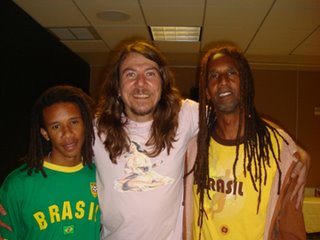
Thursday August 3, 2006
The audience sang every word of all his songs.
His deeply poetic words echoed through the concert hall.
I became a fan of his in 1993 when his cousin Ivan shared his first CD: "Olho de Peixe" with me.
I value Lenine's intelligent lyrics and ironic artistic stance but above all; he is a very cool brother!
Saturday, August 05, 2006
Lenine, Brazilian Super Star!
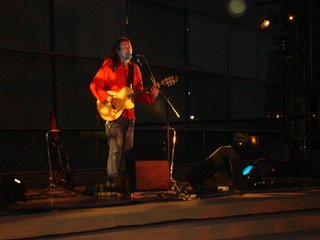 I'm happy to say that I went to Lenine's concert performance here in Los Angeles on Thursday night, August 3, 2006. Though he is a super star in his own country, Brasil, he is virtually unknown in the US.
I'm happy to say that I went to Lenine's concert performance here in Los Angeles on Thursday night, August 3, 2006. Though he is a super star in his own country, Brasil, he is virtually unknown in the US.The singer-songwriter performed without the aid of his talented band.
He courageously performed his repertoire solo and 'unplugged'. Stripped bare to a mixed audience of ex-patriot Brazilian fans and curious Angelinos, Lenine carried his music with a powerful honesty. His inner rhythm was enough to power him. Lenine's ironic poetry was largely lost on an audience of Americans who were clueless to Portuguese but his music was easily felt. I had many funny thoughts running through my mind. As I usually do, I thought about the caricatures that govern people's perceptions. Being a "world musician" makes me especially sensitive to the issues that surround music that is not mainstream in the US. If anyone came to this concert because they expected to hear samba they were deceived by their own preconceived notions of Brasil and its culture. Lenine is somewhere between a rock star and a pop star in Brasil but when American's think of Brasil their minds wander in the direction of sexy samba dancers and cheerful carnival songs. This notion of cultural caricature never escapes my psyche because old stereotypes never die. Carmen Miranda was the Brasil of the 1930's and 1940's for Americans. In the 1960's it was Astrud Gilberto and "the girl from Ipanema".In the 1990's it was Pharrel and Snoop surrounded by a bevy of Rio's beauties. The movie 'Cidade de Deus' helped to shake American's out of their stuppor but the rediscovery of Bossa Nova threatens to return their perceptions to some other Brasil that barely exists. When I was in Brasil to compose music for my CD 'Tristeza e Beleza na Cidade Negra', I listened to the radio a lot and went out to a few concerts every week. The popular music of Brasil is diverse but the traditional music of this vast country is even more varied. Their are many regional styles that are lesser known outside of South America, so much culture to offer, it is a shame that Brasil's music is marginalized by static perceptions. It reminds me that many of my African friends must still field questions about whether they have skyscrapers and city streets on the continent. Maybe the "backward people" are in America.
Thursday, August 03, 2006
Art, Culture and history
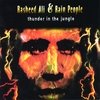 Somewhere along the way I wondered if I had strayed from my own mission for this blog. Then I absolved myself of any guilt by coming to the realization that my mission has always featured education prominently. My creative desires have always been fueled by my by quest for knowledge. History has always been my passionate pursuit. My inclusion of information about great scholars and historians is not tangential but intrinsic to my artistic mission.
Somewhere along the way I wondered if I had strayed from my own mission for this blog. Then I absolved myself of any guilt by coming to the realization that my mission has always featured education prominently. My creative desires have always been fueled by my by quest for knowledge. History has always been my passionate pursuit. My inclusion of information about great scholars and historians is not tangential but intrinsic to my artistic mission.I have sat through lectures by Dr. John Henrik Clarke & Professor Runoko Rashidi. The energy that flows from a greater knowledge of the collective African Diaspora infuses my work with confidence. I know that I am part of a continuum of African artistic expression.
Runoko Rashidi's work on the Afro-Asiatic historical connections led me compose the song:
The Lost Tribe .
Friday, July 28, 2006
Dollar Bills falling like Snow
 About five years ago I had the opportunity to play keyboards and percussion with Chief Doctor Oliver De Coque from Nigeria, one of the legends of African music. I was not really familiar with his legendary status prior to performing with him but the excitement that surrounded his show was palpable. I soon realized that there are at least four volumes of Chief Doctor Oliver De Coque "Hits" on the market because the man has 86 recordings to his credit! I learned that he has had many titles conferred upon him; the Alaafin of Oyo crowned him the King of Highlife music. In 1994, he was conferred with the honorary doctor of letters in Music at the University of New Orleans. Among his Igbo ethnic group he also has the honorary title of Ikemba.
About five years ago I had the opportunity to play keyboards and percussion with Chief Doctor Oliver De Coque from Nigeria, one of the legends of African music. I was not really familiar with his legendary status prior to performing with him but the excitement that surrounded his show was palpable. I soon realized that there are at least four volumes of Chief Doctor Oliver De Coque "Hits" on the market because the man has 86 recordings to his credit! I learned that he has had many titles conferred upon him; the Alaafin of Oyo crowned him the King of Highlife music. In 1994, he was conferred with the honorary doctor of letters in Music at the University of New Orleans. Among his Igbo ethnic group he also has the honorary title of Ikemba.The night that I played with him was very memorable for me. The show occurred during the month of Ramadan which meant that I was fasting from dawn to dusk. After a day of not eating or drinking water, I had to find the intense energy to play music Nigerian style. When Nigerians play music it can be a test of endurance. I once saw Fela Kuti play from 9pm-2am without a break! Lucky for me, being a Caribbean musician means learning how to play Carnival style which is also an endurance test.
The band started at 9pm and played two sets without the Chief, as the late arriving African crowd warmed up. After midnight, we took the stage and started to play a Highlife groove while some beautiful girls spread a path of rose petals from the dressing room to the stage. The crowd began to stir when the Chief emerged in full royal regalia complete with a real leopard skin cape. One of the girls handed him his flaming red guitar when he reached the edge of the stage. The Chief looked to the band and then launched us into the stratosphere of African funkiness. We played until the band's groove reached a plateau that allowed the Chief to begin his famous "praise singing".
Praise singing is a Nigerian tradition. The praise-singer will call on stage community leaders, elders, politicians, and party hosts to literally sing their praises. The singer draws upon diverse and complex knowledge about family names and reputations, historic poetry and epic tales, and geography and regional folklore to create relevant stories or admiration that honor the addressee.
The recipient of the praise responds in kind by "“spraying"” the singer with cash is done in many ways and with a lot of style. It can take the form of pasting dollar bills on the singer's sweaty forehead, showering the singer with money, or other ways of demonstrating gratitude for the praise. In fact, the method of spraying has itself taken on an art form, with some sprayers having a reputation for their particular style of spraying. And the longer you stick money on the singer, the longer the audience is focused on giving you attention. But once your money runs out, you must make room for the next person to be praised. There was a long line of Igbos waiting their turn to be paid homage to that night. It was as if each person suddenly had their own personalized song. Not only were the words a tribute to them but the grooves would change to suit the person. The chief was not the only one being sprayed with cash! I was playing my butt off and sweating a river. My musical intensity was rewarded by people who plastered money on my sweating face and forehead. Spraying is almost mystical, the more the band gets sprayed with money, the more the music intensifies. I felt like I was in a trance and when I looked around from my delirium; I was standing in a pile of money. There was money all over the stage like snow! The line of patrons did not seem to get shorter. The music never stopped. The chief would lead us from one groove to the other with a skillful hand. We would seamlessly go from one great person to the next. Some people had so much style to their spraying of the band that they became a show for us. They would dance around the stage with two fists of cash. Then when the moment was right they would toss the bills high in the air. The shower of bills was surreal and I would watch the money float down around my keyboard until it was covered in money.
It was 4am when we finally ended the praising and I could only laugh at how many times the Chief's assistant had run onto the stage to collect all of the bills. He would collect them when they seemed to be like a thin blanket covering the stage. Within minutes he would have to return to fill his sack again. I have no idea how many times he filled that sack between the hours of 12am and 4am but he was a busy little man.
When the show was over all of my band mates lavished me with praise because I had played for so many hours without a proper meal. They were amazed that I had only broken my fast with dates and water before the night of music began.
Wednesday, July 26, 2006
Confused by the Color of their Skin!
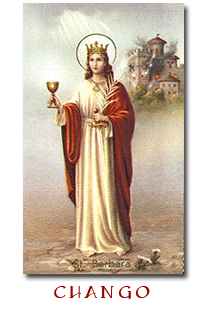 I had a friend from Nigeria who was a Yoruba. She moved into a predominantly latino area of Brooklyn. One hot summer night she heard the distinct sound of drums. She was startled by the sound of her own traditional Yoruba rhythms. She immediately went outside and followed the sound of the drums to a nearby park. When she arrived at the park she was taken aback by the sight of a group of "white" Puerto Ricans playing the drums. She was instantly confused as she had just arrived in NYC.
I had a friend from Nigeria who was a Yoruba. She moved into a predominantly latino area of Brooklyn. One hot summer night she heard the distinct sound of drums. She was startled by the sound of her own traditional Yoruba rhythms. She immediately went outside and followed the sound of the drums to a nearby park. When she arrived at the park she was taken aback by the sight of a group of "white" Puerto Ricans playing the drums. She was instantly confused as she had just arrived in NYC.Who are these "White Africans"? How did they learn my culture?
She called me on the telephone and told me how confused she was by this group of "White Africans" who spoke Spanish. I could only laugh.
Listen to: Africano and Africa Occidental
Tuesday, July 25, 2006
Intellectual Racism?

When I was growing up we had this incredible set of encyclopedia; The Encyclopedia Britannica.
This was the original, made in England, set of books that explained the universe of thought in every minute detail. Surely, I can attribute much of my intellectual headstart in life to the presence of this great library of British intellect. There was just one thing that I noticed early on, an extreme Euro-centric, white supremist view of the world that was shocklingly matter of fact.
Written into the informative text histories of the yellow, brown and black world were little racist concepts that were included as fact. I would reread things like: "the Africans as part of their nature are not inclined towards hard work..." in disbelief. If you doubt this fact all you have to do is dust off an old copy of Encyclopedia Britannica, British Edition. Nothing of value was attributed to people of African descent and we were largely missing from the pages of great accomplishments.
When I first became aware of the work of people like JA Rogers, John Henrik Clarke and Arturo Schomburg I was amazed at how marginalized they were within the world of academia.
I thought that eventually the world would gradually change and inellectual fairness would win out. Instead, a new generation of educated racists have taken their place.
Today, more anti-intellectual Afro-American streotypes exist than ever before.
If an African-American male college student is on a major university campus it is assumed that he is a student-athlete. A shocking number of African-American males are not even graduating from high school! I feel compelled to celebrate the lives of some African-American historians who have dedicated their lives to toiling in virtual obscurity to collect our stories.
Is there a Afro-American Audience for World Music?

Being a "World Musician" brings me in contact with many social and cultural phenomena.
In the US, being classified as a world musician brings me into contact with several social realities. I am increasingly aware of the demographics that sustain my chosen musical genre.
- It has been determined that world music followers are primarily people who have a college education.
- People with a college education are more likely to have been exposed to other cultures.
- Most world music format radio shows are on college campuses.
- Most world music in the United States is performed in university concert halls.
- This audience would also tend to be mostly female since upwards of 60-70% of all college students in America are female.
What that means to me is; the African-American audience for world music should be expected to be extremely low. It also suggests that a male African-American is much less likely to be a world music fan that all others.
Maybe I need to prepare a marketing plan for basketball & football players.
The Council of Elders: JA Rogers
 JA Rogers (1883-1966) was a world traveler, a prolific writer, an accomplished lecturer, and the first Black war correspondent. Rogers became an anthropologist, historian, journalist and publisher. He was a scholar unparalleled in assembling information about African people, and probably did more to popularize African history than any single writer of the twentieth century.
JA Rogers (1883-1966) was a world traveler, a prolific writer, an accomplished lecturer, and the first Black war correspondent. Rogers became an anthropologist, historian, journalist and publisher. He was a scholar unparalleled in assembling information about African people, and probably did more to popularize African history than any single writer of the twentieth century.Joel Augustus Rogers was a man without peer in gathering up and binding the missing pages of African history.
"Rogers came from Jamaica in the West Indies. He settled in Chicago. He eventually took a job as a Pullman porter so he could visit different cities and libraries and do research. I got an interesting story about that. The story was that in a lot of large cities a lot of libraries were for whites only. Black people weren't permitted to go into them. So Rogers had to pay the Pullman conductor to go to the libraries and take out books from them. The conductor said, "Rogers, I believe you're a damn fool. But if you want to throw away your money that way, I'm willing to cooperate."
JA Rogers was a meticulous researcher, astute scholar and very concise writer. He traveled tirelessly on his quest for knowledge which often took him directly to the source for information for his books. While traveling in Europe he frequented libraries, museums, castles and many places of interest that would help to prove Africans had an ancestry and history that the world could and should be proud of. He challenged the biased viewpoint of Eurocentric historians and anthropologist eventually destroying the myth of African inferiority through his books Sex and Race Vol.(1-3)
Rogers worked to prove that color of skin is not what determines intellectual genius and that Africans have contributed much more to the world than what was previously stated.
Rogers was self-financed, self educated, self-published. His collections of works are enormous exstensive complete with detailed references documented ever so carefully to prevent scrutiny of his facts are a testament to his due dilligence, work ethic and commitment to not only African people, but the world, its history and culture.
Rogers was linked to both Haile Selassie and Marcus Garvey, whom he knew from their youth in Jamaica. He wrote regularly for Garvey's UNIA's weekly newspaper, the Negro World. In 1923 he covered the Marcus Garvey trial and he also interviewed Garvey in prison for the New York Amsterdam News in 1926. In 1930 Rogers went to Ethiopia as a correspondent for the New York Amsterdam News to attend the coronation of Haile Selassie I.
A prodigious and meticulous detective, Rogers did exhaustive, primary research into the global history of African people. In 1925 he went to Europe for investigations in the libraries and museums there.His travels made easier by the fact that he spoke Spanish, French, Portuguese, Italian and German. In 1927 he returned to Europe for research lasting three years, and journeyed to North Africa during the same period. Between 1930 and 1933 Rogers continued his explorations in Europe, while in 1930, 1935 and 1936 he pursued his researches in Egypt and Sudan.
When publishing houses refused to publish his works, undeterred, Rogers published them himself. All told, J.A. Rogers wrote and published at least sixteen different books and pamphlets. These publications became classic works--works that were circulated primarily in African communities. Rogers' texts covered the entire spectrum of the global African community, from ancient and modern Africa, to Asia, Australia, the South Pacific, Europe and the Western Hemisphere.Among Rogers' most acclaimed and prominent works are: From Superman to Man, One-Hundred Amazing Facts About the Negro, The Real Facts About Ethiopia, Sex and Race, Nature Knows No Color-Line, and World's Great Men of Color.
Rogers' first publication, From Superman to Man, was published in 1917 and focused on "the stupidity of racism." The book was called; "a genuine treasure," and "the greatest book ever written in English on the Negro by a Negro."
One Hundred Amazing Facts About the Negro With Complete Proof: A Short Cut to the World History of the Negro went through many printings and at least eighteen editions. A singularly provocative quote in One Hundred Amazing Facts About the Negro is by the English scholar and traveler Samuel Purchas (ca. 1575-1626)). According to Rogers, Purchas claimed that "of all (the kings of Ethiopia), Ganges was most famous, who with his Ethiopian army passed into Asia and conquered all as far as the River Ganges, to which he left that name." In the same book Rogers mentioned that "Beethoven, the world's greatest musician, was without a doubt a dark mulatto. He was called `The Black Spaniard.'"
In 1935, dissatisfied with the reporting of news by the White press concerning the Italian invasion and occupation of Ethiopia, Rogers served as war correspondent in Ethiopia for the Pittsburgh Courier newspaper. After returning to the United States in 1936 he published a highly popular illustrated pamphlet entitled The Real Facts About Ethiopia.
Sex and Race was published in three volumes from 1941 to 1944. The first volume focuses on antiquity and is arguably the most fundamental of the three. As to ancient Asia, for example, Rogers devoted several pages of Sex and Race to the Black presence in early Japan. In the process he cites the studies of a number of accomplished scholars and anthropologists, raising the question "were the first Japanese Negroes?"
Other chapters are devoted to "The Negro in Ancient Greece," "Negroes in Ancient Rome and Carthage" and "Were the Jews Originally Negroes?" The appendices of Sex and Race are equally fascinating, focusing on "Black Gods and Messiahs" and the "History of the Black Madonnas." In Volume Two of Sex and Race Rogers examines "racism and race-mixing in the New World," while Volume Three of Sex and Race seeks to define the concept of race itself. Like most of his works, all three volumes of Sex and Race are lavishly illustrated.
and thus laid the basis of religion and all true culture and civilization."
--Joel Augustus Rogers



